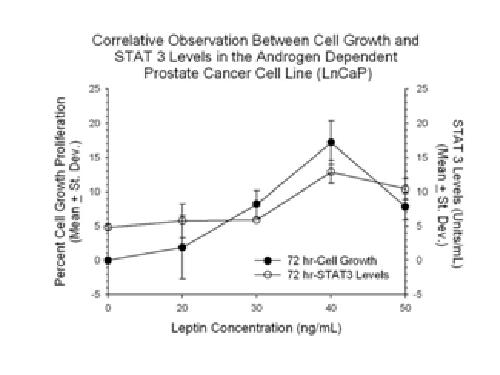|
Back to 2011 Program
The Relation between Leptin and Prostate Cancer Cell Line LnCaP
Mohamad W Salkini, Dake Ruggs, Barbara Jacksom
West Virginia University, Morgantown, WV
Introduction:
Leptin, the adipocyte-derived hormone is associated with an increased risk of multiple cancers including prostate cancer. We hypothesized that leptin would change hormone dependent prostate cancer cells to hormone independent cells. Signal transducer and activator of transcription 3 (STAT3) plays a key role in many cellular processes such as cell growth and apoptosis. Increased expression of STAT 3 in LnCaP prostate cancer cells precedes the transition into castrate resistance status.
Materials & Methods:
The androgen dependent human prostate cancer cell line, LnCaP, was exposed to Leptin at different concentrating (0, 20, 30, 40 and 50 ng/mL). Cell viability and STAT3 protein were assayed using MTT and ELISA respectively after 72 hours of exposure to leptin. All data is reported as means + standard deviation.
Results: A gradual increase in LnCaP cellular proliferation was observed and reached statistical significance at concentrations of 30 (8.2% + 2.0), 40 (17.2% + 3.2) and 50 ng/ml (7.8% + 2.0) of Leptin (P<0.001). STAT3 levels increased steadily along with the proliferation and reached statistical significance at 40 ng/ml concentration of Leptin (12.9 + 1.7 units/ml, P<0.05). The described changes peaked at concentration 40ng/ml of leptin.
Conclusions: : Increased Leptin levels induced significant in vitro cellular proliferation and increase STAT-3 levels of hormone dependent prostate cancer cells. These findings demonstrate some of the effects of obesity on prostate cancer. 
Back to 2011 Program
|